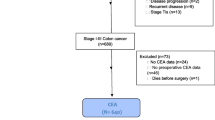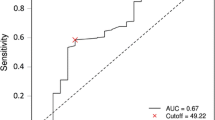Abstract
Background
Excess body weight is associated with a risk of several malignancies, including colon cancer. However, the oncological significance of evaluating body mass index (BMI) preoperatively in colorectal cancer (CRC) patients undergoing curative surgery has not been fully evaluated.
Methods
Clinicopathological findings including BMI and laboratory data [carcinoembryonic antigen (CEA) and neutrophil/lymphocyte ratio (NLR)] from 358 curative CRC patients (open surgery group: n = 157; laparoscopic surgery group: n = 201) were assessed as indicators of survival outcome. BMI <20 was defined as underweight in both groups.
Results
Not all categories of pathological findings were associated with BMI in both groups. Patients with BMI <20 showed significant poorer overall survival (OS) in the open surgery group. In addition, patients with BMI <20 in the laparoscopic surgery group were also significantly worse in OS and disease-free survival (DFS). Furthermore, multivariate analysis demonstrated that BMI was validated as independent predictors for OS and DFS in both groups. BMI had a significant negative correlation with NLR, which reflects host immune response in both groups.
Conclusions
Lower BMI is a promising predictor of recurrence and prognosis in curative CRC patients.





Similar content being viewed by others
References
Renehan AG, Tyson M, Egger M et al (2008) Body-mass index and incidence of cancer: a systematic review and meta-analysis of prospective observational studies. Lancet 371:569–578
Gilbert CA, Slingerland JM (2013) Cytokines, obesity, and cancer: new insights on mechanisms linking obesity to cancer risk and progression. Annu Rev Med 64:45–57
Calle EE, Kaaks R (2004) Overweight, obesity and cancer: epidemiological evidence and proposed mechanisms. Nat Rev Cancer 4:579–591
Matsuda M, Shimomura I (2013) Increased oxidative stress in obesity: implications for metabolic syndrome, diabetes, hypertension, dyslipidemia, atherosclerosis, and cancer. Obes Res Clin Pract 7:e330–e341
Sparano JA, Wang M, Zhao F et al (2012) Obesity at diagnosis is associated with inferior outcomes in hormone receptor-positive operable breast cancer. Cancer (Phila) 118:5937–5946
Ho T, Gerber L, Aronson WJ et al (2012) Obesity, prostate-specific antigen nadir, and biochemical recurrence after radical prostatectomy: biology or technique? Results from the SEARCH database. Eur Urol 62:910–916
Leroy J, Ananian P, Rubino F et al (2005) The impact of obesity on technical feasibility and postoperative outcomes of laparoscopic left colectomy. Ann Surg 241:69–76
Nitori N, Hasegawa H, Ishii Y et al (2009) Impact of visceral obesity on short-term outcome after laparoscopic surgery for colorectal cancer: a single Japanese center study. Surg Laparosc Endosc Percutan Tech 19:324–327
Park JW, Lim SW, Choi HS et al (2010) The impact of obesity on outcomes of laparoscopic surgery for colorectal cancer in Asians. Surg Endosc 24:1679–1685
Schwandner O, Farke S, Schiedeck TH et al (2004) Laparoscopic colorectal surgery in obese and nonobese patients: do differences in body mass indices lead to different outcomes? Surg Endosc 18:1452–1456
Lascano CA, Kaidar-Person O, Szomstein S et al (2006) Challenges of laparoscopic colectomy in the obese patient: a review. Am J Surg 192:357–365
Takeuchi K, Kuwano H, Tsuzuki Y et al (2004) Clinicopathological characteristics of poorly differentiated adenocarcinoma of the colon and rectum. Hepatogastroenterology 51:1698–1702
Sugao Y, Yao T, Kubo C et al (1997) Improved prognosis of solid-type poorly differentiated colorectal adenocarcinoma: a clinicopathological and immunohistochemical study. Histopathology (Oxf) 31:123–133
Hyngstrom JR, Hu CY, Xing Y et al (2012) Clinicopathology and outcomes for mucinous and signet ring colorectal adenocarcinoma: analysis from the National Cancer Data Base. Ann Surg Oncol 19:2814–2821
Giakoustidis A, Neofytou K, Khan AZ et al (2015) Neutrophil to lymphocyte ratio predicts pattern of recurrence in patients undergoing liver resection for colorectal liver metastasis and thus the overall survival. J Surg Oncol 111:445–450
Chang Z, Zheng J, Ma Y et al (2014) The neutrophil-to-lymphocyte ratio as a predictor for recurrence of colorectal liver metastases following radiofrequency ablation. Med Oncol 31:855
Shibutani M, Maeda K, Nagahara H et al (2013) A high preoperative neutrophil-to-lymphocyte ratio is associated with poor survival in patients with colorectal cancer. Anticancer Res 33:3291–3294
Kalantar-Zadeh K, Horwich TB, Oreopoulos A et al (2007) Risk factor paradox in wasting diseases. Curr Opin Clin Nutr Metab Care 10:433–442
Flegal KM, Kit BK, Orpana H et al (2013) Association of all-cause mortality with overweight and obesity using standard body mass index categories: a systematic review and meta-analysis. JAMA 309:71–82
Hakimi AA, Furberg H, Zabor EC et al (2013) An epidemiologic and genomic investigation into the obesity paradox in renal cell carcinoma. J Natl Cancer Inst 105:1862–1870
Sinicrope FA, Foster NR, Yothers G et al (2013) Body mass index at diagnosis and survival among colon cancer patients enrolled in clinical trials of adjuvant chemotherapy. Cancer (Phila) 119:1528–1536
Fridlender ZG, Albelda SM (2012) Tumor-associated neutrophils: friend or foe? Carcinogenesis (Oxf) 33:949–955
Fridman WH, Pages F, Sautes-Fridman C et al (2012) The immune contexture in human tumours: impact on clinical outcome. Nat Rev Cancer 12:298–306
Wein A, Hahn EG, Merkel S et al (2000) Adjuvant chemotherapy for stage II (Dukes’ B) colon cancer: too early for routine use. Eur J Surg Oncol 26:730–732
Haller DG (1995) An overview of adjuvant therapy for colorectal cancer. Eur J Cancer 31A:1255–1263
Benson AB 3rd, Schrag D, Somerfield MR et al (2004) American Society of Clinical Oncology recommendations on adjuvant chemotherapy for stage II colon cancer. J Clin Oncol 22:3408–3419
Schmoll HJ, Van Cutsem E, Stein A et al (2012) ESMO consensus guidelines for management of patients with colon and rectal cancer. A personalized approach to clinical decision making. Ann Oncol 23:2479–2516
Author information
Authors and Affiliations
Corresponding author
Ethics declarations
Conflict of interest
The authors have no conflicts of interest to disclose.
About this article
Cite this article
Toiyama, Y., Hiro, J., Shimura, T. et al. The impact of body mass index on oncological outcomes in colorectal cancer patients with curative intent. Int J Clin Oncol 21, 1102–1110 (2016). https://doi.org/10.1007/s10147-016-1016-7
Received:
Accepted:
Published:
Issue Date:
DOI: https://doi.org/10.1007/s10147-016-1016-7




